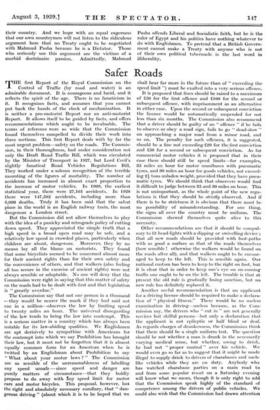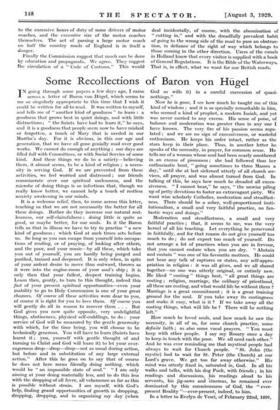Safer Roads
THE first Report of the Royal Commission on the Control of Traffic (by road and water) is an admirable document. It is courageous and lucid, and it reflects the spirit of the age. There is no fanaticism in it. It recognizes facts, and assumes that you cannot put back the hands of the clock of mechanization. It is neither a pro-motorist Report nor an anti-motorist Report. It allows itself to be guided by facts, and offers recommendations which ought to be invaluable. The terms of reference were so wide that the Commission found themselves compelled to divide their work into three sections. This first Report deals with by far the most urgent problem—safety on the roads. The Commis- sion, in their thoroughness, had under consideration not only the Draft Road Traffic Bill, which was circulated by the Minister of Transport in 1927, but Lord Cecil's slightly fanatical Road Vehicles Regulations Bill. They worked under a solemn recognition of the terrible mounting of the figures of mortality. The number of accidents has increased in almost exact proportion to the increase of motor vehicles. In 1909, the earliest statistical year, there were 27,161 accidents. In 1928 there were 147,582 accidents, including more than 6,000 deaths. Truly it has been said that the safest place in the world is an English railway train, the most dangerous a London street.
But the Commission did not allow themselves to play with the idea of a panicky and retrograde policy of cutting down speed. They appreciated the simple truth that a high speed in a broad open road may be safe, and a relatively low speed in crowded places, particularly when children are about, dangerous. Moreover, they by no means lay all the blame on motorists. They found that some bicyclists seemed to be concerned almost more for their ancient rights than for their own safety and the convenience of others, and that walkers (also feeling all too secure in the exercise of ancient rights) were not always sensible or adaptable. No one will deny that the Commission were right in saying that this matter of safety on the roads had to be dealt with first and that legislation is " greatly overdue."
The Commission say that not one person in a thousand —they would be nearer the mark if they had said not one in a million—observes the law by limiting speed to twenty miles an hour. The universal disregarding of the law tends to bring the law into contempt. This is a serious matter in a country which has always been notable for its law-abiding qualities. We Englishmen are apt derisively to sympathize with Americans for the contempt into which we say Prohibition has brought their law, but it must not be forgotten that it is almost equally common form for an American when he is twitted by an Englishman about Prohibition to say " What about your motor laws ? " The Commission are so sensible of the unreasonableness of labelling any speed unsafe —since speed and danger are purely matters of circumstance—that they boldly propose to do away with Ey speed limit for motor ears and motor bicycles. This proposal, however, has the- right and absolutely necessary corollary, that " dan- gerous driving " (about which it is to be hoped that we shall hear far more in the future than of " exceeding the speed limit ") must be exalted into a very serious offence. It is proposed that fines should be raised to a maximum of £50 for the first offence and £100 for the second or subsequent offence, with imprisonment as an alternative in either case. Upon the second or subsequent conviction the licence would be automatically suspended for not less than six months. The Commission also recommend that a driver should be guilty of an " offence " if he fails to observe or obey a road sign, fails to go " dead-slow " on approaching a major road from a minor road, and so on. The penalty for such offences, it is suggested, should be a fine not exceeding £20 for thefirst conviction and £50 for a second or subsequent conviction. As for commercial motor vehicles it is proposed that in their case there should still be speed limits—for examples, 35 miles an hour for motor omnibuses with pneumatic tyres, and 30 miles an hour for goods vehicles, not exceed- ing 2i tons unladen weight, provided that they have pneu- matic tyres. We should think that observers would find it difficult to judge between 35 and 80 miles an hour. This is not unimportant, as the whole point of the new regu- lations is that they should be strictly observed. And if there is to be strictness it is obvious that there must be no possibility of misunderstanding. For one thing, the signs all over the country must be uniform. The Commission showed themselves quite alive to this necessity.
Other recommendations are that it should be compul- sory to fit head-lights with a dipping or swivelling device ; that all new roads should be provided with foot-paths with as good a surface as that of the roads themselves (how sensible ! otherwise the walkers would be found on the roads after all), and that walkers ought to be encour- aged to keep to the left. This is sensible again. Our national custom has been to keep to the right on foot, but it is clear that in order to keep one's eye on on-coming traffic one ought to be on the left. The trouble is that at present the old rule is gradually losing sanction, but no new rule has definitely replaced it.
Another useful recommendation is that an applicant for a driving licence should be required to make a declara- tion of " physical fitness." There would be no useless examination in driving—useless because, as the Com- mission say, the drivers who " cut in " are not generally novices but skilful persons—but only a declaration that the applicant is not epileptic or half blind or deaf. As regards charges of drunkenness, the Commission think that there should be a single uniform test. The question should be not whether a man is drunk in the necessarily varying medical sense, but whether, owing to drink, he had not " proper control " over his vehicle. We would even go so far as to suggest that it might be made illegal to supply drink to drivers of charabancs and such- like vehicles while they are on duty. Anybody who has watched charabanc parties on a main road to and from some popular resort on a Saturday evening will know what we mean, though it is only right to add that the Commission speak highly of the standard of competence among the drivers of public vehicles. We could also wish that the Commission had drawn attention to the excessive hours of duty of some drivers of motor coaches, and the excessive size of the motor coaches -themselves. The act of passing a large motor coach on half the country roads of England is in itself a danger.
Finally the Commission suggest that much can be done by education and propaganda. We agree. They suggest the circulation of a " Code of Customs." This would deal incidentally, of course, with the abomination of " cutting in," and with the dreadfully prevalent habit of going to the wrong side of the road to pass an obstruc- tion, in defiance of the right of way which belongs to those coming in the other direction. Users of the canals in Holland know that every visitor is supplied with a book of General Regulations. It is the Bible of the Waterways. That is, in effect, what we want for our British roads.



































 Previous page
Previous page